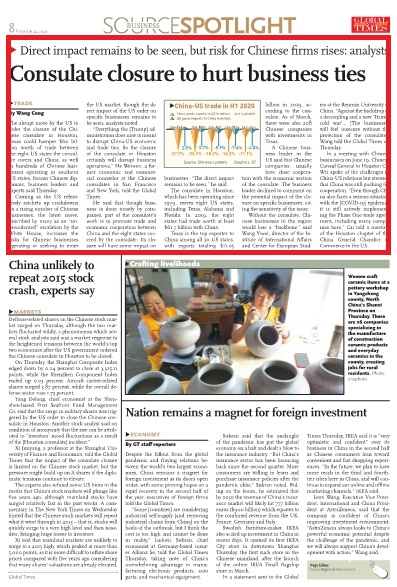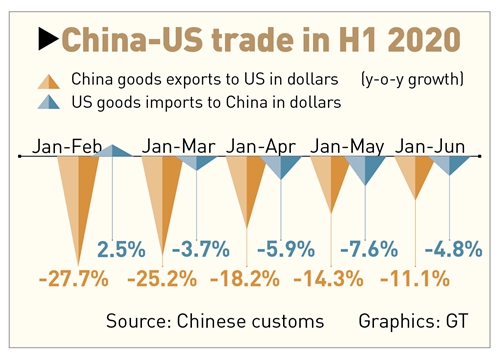Major Power Relations
Your Present Location: PROGRAMS> Major Power RelationsConsulate closure to hurt business ties
Source: Global Times Published: 2020-07-23
The abrupt move by the US to order the closure of the Chinese consulate in Houston, Texas could hamper $60 billion worth of trade between the eight US states the consulate covers and China, as well as hundreds of Chinese businesses operating in southern US states, former Chinese diplomats, business leaders and experts said Thursday.
Coming as the US relentlessly ratchets up crackdowns on a rising number of Chinese businesses, the latest move, described by many as an "unprecedented" escalation by the White House, increases the risks for Chinese businesses operating or seeking to enter the US market, though the direct impact of the US order on specific businesses remains to be seen, analysts noted.

"Everything the [Trump] administration does now is meant to disrupt China-US economic and trade ties. So the closure of the consulate in Houston certainly will disrupt business operations," He Weiwen, a former economic and commercial counselor at the Chinese consulates in San Francisco and New York, told the Global Times.
He said that though business is done mostly by companies, part of the consulate's work is to promote trade and economic cooperation between China and the eight southern states covered by the consulate. Its closure will have some impact on businesses. "The direct impact remains to be seen," he said.
The consulate in Houston, which has been operating since 1979, serves eight US states, including Texas, Alabama and Florida. Many of those states have enormous business relations with China. In 2019, the eight states had trade worth at least $61.7 billion with China.
Texas is the biggest exporter to China among all 50 US states, with exports totaling $11.05 billion in 2019, according to the consulate. As of March, there were also 208 Chinese companies with investments in Texas.

A Chinese business leader in the US said that Chinese companies usually have close cooperation with the economic section of the consulate. The business leader declined to comment on the potential impact of the closure on specific businesses, citing the sensitivity of the issue.
Without the consulate, Chinese businesses in the region would lose a "backbone," said Wang Yiwei, director of the Institute of International Affairs and Center for European Studies at the Renmin University of China. "Against the backdrop of a decoupling and a new 'Trump cold war'… [The businesses] will feel insecure without the protection of the consulate," Wang told the Global Times on Thursday.
In a meeting with Chinese businesses on June 19, Chinese Consul General in Houston Cai Wei spoke of the challenges in China-US relations but stressed that China was still pushing for cooperation.
"Even though China also faces a serious situation with the [COVID-19] epidemic, it is still actively implementing the Phase One trade agreement, including many companies here," Cai told a meeting of the Houston chapter of the China General Chamber of Commerce in the US.
Under the trade deal signed in January, China pledged to purchase $200 billion worth of US products in two years, including $50 billion worth of energy products. Energy products are a main export of some of the eight states to China. For instance, Texas exported about $2.6 billion worth of fossil fuels to China in 2019.
Gao Lingyun, an expert at the Chinese Academy of Social Sciences who follows the trade talks closely, said that China's purchase of US energy products has not been as big as purchases of agricultural products this year and the impact of the consulate closure on the phase one deal remains to be seen.
"I think this is a diplomatic issue that will be addressed diplomatically and should not be extended to trade. As far as the Chinese side is concerned, I think we are still committed to carrying out the deal," Gao told the Global Times Thursday.
He Weiwen is a senior fellow at the Chongyang Institute for Financial Studies, Renmin University. Wang Yiwei is a professor at the School of International Studies and senior fellow of Chongyang Institute for Financial Studies, Renmin University of China.























































































 京公网安备 11010802037854号
京公网安备 11010802037854号





